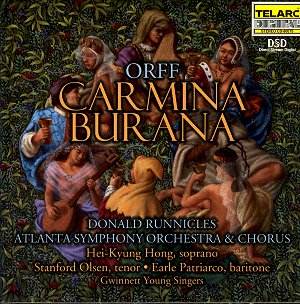Carmina Burana, despite its fascist adoration
of the past and overbearing vulgarity, is one of the most popular works
in the repertoire. For those not put off by its relentless tedium, there
are dozens of recordings available, including the benchmark performance
by Eugen Jochum. This version, excellently played and enthusiastically
sung, can hold its own with most of them, but whether it is electric
enough to be a first recommendation is debatable.
Donald Runnicles, a conductor who has an impressive
list of appointments all over the world, except in his native Britain,
directs intelligently, with natural tempi and a natural feeling for
the sweep of the piece. The orchestral playing is excellent, in that
American way of immaculate intonation and clear tone, but without the
extra oomph that distinguishes the very best. The soloists likewise
are impressive without being distinguished. Stanford Olsen is far from
bad, but others negotiate the viciously high section of Olim lacus
colueram better. Similarly the baritone Earle Patriarco is short
of outstanding. The choral singing is vibrant throughout, and great
play is made in the notes of the authentic 13th century pronunciation
adopted. It seems to me however to be against the spirit of the work:
in fascist art the past is not an artefact to be approached in an archaeological
fashion, rather it is something to be recreated in its own time, with
its own accent.
The recording is clear, although the balances sometimes
sound a little artificial, like the percussion that predominates in
the opening or the French horn that seems to rise to the surface whenever
it has a solo. The deficiencies highlighted here should not give the
impression that this recording is in any way bad or sub-standard – it
is easy to get much enjoyment from this performance – but the competition
in a crowded field is such that this version does not live with the
very best.
Aidan Twomey


